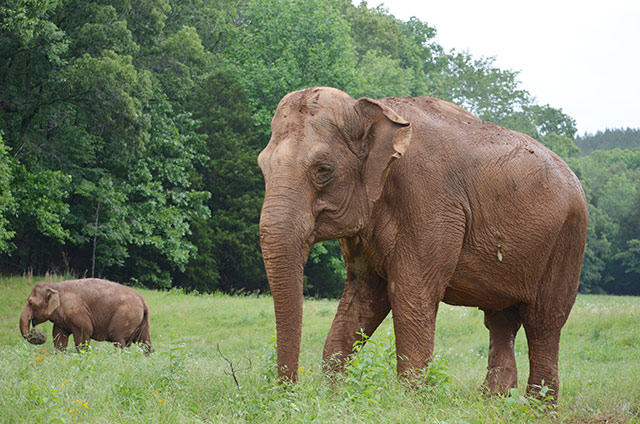It’s World Elephant Day!

Elephants “Tarra” and “Shirley” in natural-habitat sanctuary
Wednesday, August 12 is World Elephant Day, a day designated to bring awareness to the plight of the African and Asian elephant. The Elephant Sanctuary in Tennessee encourages you to join us in taking steps to help these magnificent animals.
Things you can do:
- Support organizations that are working to: stop the illegal poaching and trade of elephant ivory, protect wild-elephant habitat, and solve conflicts between elephants and humans.
- Study the tenets of “sanctuary,” and support organizations that provide natural-habitat sanctuary for domesticated elephants and other exotic animals to live freely.
- We’d love for you to consider adopting a TES elephant!
- You might also consider helping to bring the story of Sanctuary elephants to your community by becoming an EleAmbassador. Our EleAmbassadors receive training from The Sanctuary in how to share the mission and work of The Sanctuary via presentations to the public, staffing info booths, and just passing information on to friends.
- We’d love for you to consider adopting a TES elephant!
- Talk about elephants at your local school(s): Initiate an elephant study-group to share knowledge and ideas about the plight of elephants, what can be done to ensure their future survival. You could even arrange for a Distance Learning program from The Elephant Sanctuary!
- Familiarize yourself with the differing means of training captive elephants: positive-reinforcement (Protected Contact), versus negative reinforcement (traditionally, through use of a bullhook).
- Support legislation to ban use of the bullhook and chains for elephants who are part of circuses and traveling animal acts, including proposed local bans. Many communities have successfully prohibited circuses that feature wild animals from coming to town by working to pass a local ordinance that restricts wild-animal acts.
- Check to see if there are organized awareness-campaigns around the circumstances for specific captive elephants, and get involved: write letters to the editors of your local newspapers; contact your local, state, federal elected officials and/or USDA (the regulatory authority for captive elephants in America); and tell your relatives, friends, co-workers, and local businesses about your research.
- If you wish to experience elephants in their natural environment, choose eco-tourism operators who support local elephant conservation projects, and who treat elephants with respect and dignity.
- Be an elephant-aware consumer. Do not purchase ivory products linked to the ongoing poaching crisis. Do not purchase coffee that isn’t fair-trade or shade-grown, or palm-oil products, as these crops are grown in plantations that decimate elephant habitats. Wood products certified by the Forest Stewardship Council promote responsible management of the world’s forests – the natural habitat for wild elephants.
